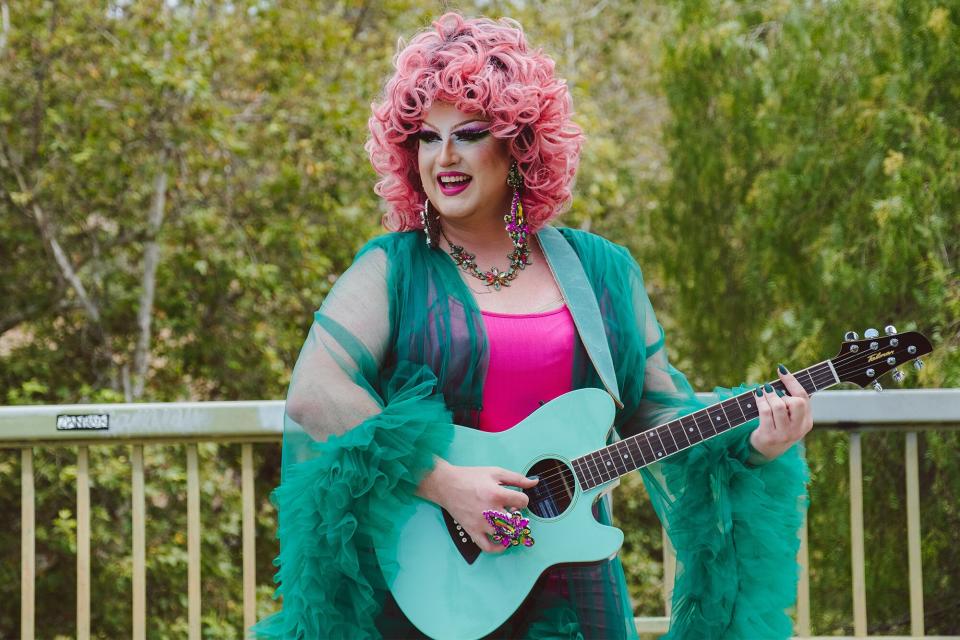Christian drag queen Flamy Grant's No. 1 album is battle cry against 'terrible theology' of religious bigots

The road to hell is paved with the bruised egos of those who try to cross a drag queen.
Though mainstream TV has conditioned many to view the world of drag performance through the ever-present lens of RuPaul's Drag Race, Christian musician and drag artist Flamy Grant's recent success story highlights a growing conflict for queer Americans living outside the mainstream bubble. The North Carolina native saw a massive spike in sales after a public feud with anti-LGBTQ singer and former conservative political candidate Sean Feucht, who criticized Flamy for putting Caedmon's Call band member Derek Webb into drag for the pair's "Boys Will Be Girls" music video.
Flamy says Feucht subsequently slammed the duo's work, and attempted to downplay her career prospects — and it backfired, as Flamy's 2022 album Bible Belt Baby shot to No. 1 on the Christian iTunes charts, with the tune "Good Day" also topping the platform's Christian songs ranking.
"I'm standing in the sanctuary painted for the gods (or God, if you're monotheistic!) because queer people belong there — we have always been there and we always will be," Flamy tells EW via email. "Evangelicals like to think they own the religion and get to decide who is in or out, creating an endless cycle of trauma for the queer kids they keep making and raising in those oppressive spaces."
"I'm here in all of my draggy audacity to demand they reckon with reality: they have a terrible theology when it comes to queerness that hurts people rather than helping them connect with the divine," the artist continues. "I'm going to do my damndest to make sure the queer folks you've forced into the closet see themselves represented in the church. We hear it all the time: representation matters. That is just as true on hallowed ground as it is in Hollywood or anywhere else."
As evidenced by contestants' personal stories on shows like Drag Race and The Boulet Brothers' Dragula, religious upbringing can imprint lifelong, repressive trauma on queer youth, as can the current culture of anti-drag and anti-trans legislation sweeping American politics. Given those influences, Flamy understands the inherent conflict in her artistry: a drag queen performing music inspired by a religion that often ostracizes queer people can be a turn-off for both non-religious drag artists and their right-wing foes alike. Therein, Flamy finds inspirational power.

Courtesy of Flamy Grant Drag queen Flamy Grant performing
"I don't want to be associated with that! We're seeing vast numbers of people leave the church, and studies point to its stance on LGBTQ issues as the number one reason for the mass exodus. I think leaving is actually probably the best decision for most people. I support that, I champion that. Get out, girl. Find a place where you are wholly celebrated and loved for who you are," she writes. "The problem is there will always be more queer kids coming up in church. Who is going to show them a hopeful future?"
Brought up as a "fundamentalist Evangelical" in the South, Flamy recalls "shame and fear" governing most of her early life, and says she found solace in Christian music, as secular pop was banned in her home.
"For me, drag started out as inner child work — reparenting myself and giving myself the opportunity to explore who I was becoming before my conservative upbringing forced me into a box that was never going to hold me," she says. "The songs that I started writing in Flamy's voice were all about recovery from the religious trauma I'd endured. I found myself writing about spirituality through the lens of a drag queen."
She explains, "To me, Bible Belt Baby is a Christian album because it tells the story of someone who grew up trying to be the best Christian ever because they knew they were queer and had to work twice as hard to belong in a place that hated queerness, and despite their attempts to kick her out, she decided to plant her stiletto in sacred space."

Haley Hill Drag queen Flamy Grant
Now, just under four years into her drag career, Flamy has cut ties from evangelicalism and moved into "progressive and inclusive" sects of Christianity. She even assisted with her church's digital services during the pandemic, delivering sermons in drag and performing in churches around the country. Though she boldly carries it, lifting that torch isn't easy.
"There's been plenty of backlash online, with a handful of protest threats for events I've been involved in. I've not yet seen an actual protest materialize while I was present, but Calvary Presbyterian, a church in San Francisco where I was invited to participate in a Drag Bible Story Hour back in June, has been facing weekly protests," Flamy shares.
Through it all, what has endured for Flamy is her love for Christian pop star Amy Grant, who landed a string of crossover hits (including "Baby Baby" and "Every Heartbeat") through the '90s, and from whom Flamy took her name inspiration. The drag artist says her newfound fame hasn't led her to Grant directly, though she's had "the pleasure of talking to members of her team and a few of her friends," whom she says told her that Grant is aware of her "little homage" to the performer.
"I hope to meet her one day and thank her for being a rare bright spot and source of grape, grape joy (that's for the real Amy fans) for a closeted queer kid who just wanted to dance in the House of Love," she explains, amid her enduring quest to be that same spark that ignites the next little Flamy to come.
Subscribe to EW's Quick Drag podcast for recaps of RuPaul's Drag Race, including reactions from the cast, special guests, and more.
Related content:

 Yahoo News
Yahoo News 
